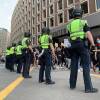The highest court in Massachusetts, the Supreme Judicial Court, holds oral arguments in appellate cases from September to May, and issues opinions in those cases throughout the year. To discuss what’s happening at the SJC this month, Daniel Medwed, GBH News Legal Analyst and Northeastern law professor, joined Sean Corcoran on Morning Edition today.
Sean Corcoran: So, Daniel, before we focus on this month’s docket, tell us about recent developments. Has the SJC issued any groundbreaking opinions lately?
Daniel Medwed: Yes, the one that caught my eye came down last Friday and it reflects the SJC’s latest effort to evaluate the legal implications of body cameras worn by the police and how it ties into the Fourth Amendment’s prohibition against unreasonable searches and seizures. In Commonwealth v. Yusuf, the police responded to a domestic disturbance call and, while on the premises, used a body camera to capture footage. Coincidentally, the police were investigating the resident of that home for a firearms offense. The officers sought to use the footage from the domestic violence response to supply the basis to get a warrant to search the house for guns.
So, the case basically had two key legal issues: First, is it OK for an officer to initially capture footage on a body cam without a warrant when he is lawfully on the premises? And second, may that footage be reviewed and used as part of an unrelated investigation?
Corcoran: What did the SJC rule?
Medwed: In effect, it issued a split decision. On the first question, it found there’s no “search,” in the constitutional sense, when an officer captures images on a body cam in a place where he is authorized to be. This is an extension of what’s known as the “plain view” doctrine — if the police have a right to be in your home for whatever reason and happen to see something like contraband out in the open, in plain view, that’s fine even if there’s no warrant.
As for the second question, though, the SJC suggested that using the footage in a different and unrelated investigation was a bridge too far — that it invaded the privacy of the occupant. This is part of the Commonwealth’s ongoing efforts to tackle with the nexus between changes in technology, like body cameras, and the Fourth Amendment. Notably, a bill was introduced in 2019 that would have created a statewide code for using body cams, and a legislative task force was created the following year to study how to regulate this technology, but so far the Legislature has not come up with a comprehensive plan. Until that happens I suspect we’ll see more cases like this.
Corcoran: Let’s shift to the current docket. Did any cases on the oral argument schedule strike you as especially significant?
Medwed: Well, one oral argument concerned the ongoing litigation by prisoners’ rights advocates to pressure the state Department of Corrections to decrease overcrowding in our facilities, which would allow for better social distancing and potentially slow down the spread of COVID-19 behind bars. A full accounting of the litigation here would take too much time, but the upshot is that our prison conditions remain fertile ground for the virus to flourish. According to the brief submitted by Prisoners’ Legal Services, roughly half of all inmates are double or triple bunked, and five prisons hold more people than their design capacity allows for. In some dormitory-style facilities, prisoners apparently sleep so close to one another that they can touch one another’s bed.
Corcoran: What do the plaintiffs want the state to do? Transfer people en masse to new facilities? Release them before the end of their sentences?
Medwed: Well, there are a couple of tools available that the Department of Corrections has arguably not used as much as it should — using home confinement more extensively as an option, furloughing some inmates, and expanding use of “good time” or other sentence-reduction programs to thin the ranks of these facilities and reduce the risk of aggravating the pandemic. The plaintiffs aren’t pressing for dangerous prisoners to be released, just people who don’t pose a public safety and can be monitored through mechanisms beyond being kept in a cage in close quarters with others while a global pandemic rages on.








